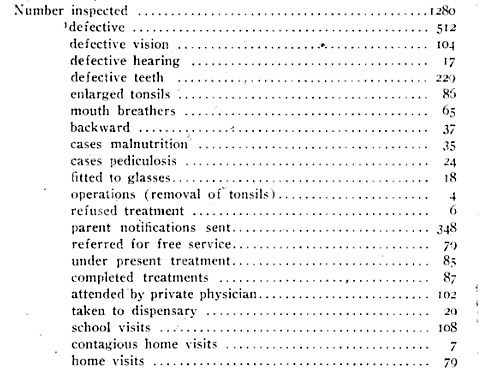
In 1916, Schenectady County schools were dissatisfied with the use of physicians to give students medical inspections: “cards were filled out and filed and nothing further was done; no attempt was made to correct defects discovered and no emphasis placed upon healthful habits of living, diet and sanitation.” So they appointed Miss Mildred B. Curtis as school nurse and charged her with inspecting students in eight rural school districts in Glenville, Niskayuna and Rotterdam. “Miss Curtis began her duties on January 10, 1916 and worked for the remainder of the school year . . . Her work has been so successful that eleven school districts have joined in engaging her for the next school year.”
In those few months, Miss Curtis inspected 1280 students, many of whom might otherwise have never seen a health professional. That she found 512 to be “defective” shouldn’t be read as the modern pejorative; a footnote explains that “most of the defects are grouped about the head, as defects of vision, hearing, teeth, tonsils, etc.” That she found so many with defective teeth should be no surprise, either as this was a time when Colgate was on a vigorous campaign to give away toothpaste to school children along with a card explaining how to brush one’s teeth. That the number of “mouth breathers” (also not pejorative, but considered unhealthful and a sign of sinus problems) outran the number of “backward” students may be a good thing, and it’s rather surprising that the number of cases of lice (“pediculosis”) was so low.
The main purpose in hiring Miss Curtis was to ensure there was follow-up, which the contracted physicians never provided. “The follow-up work in the homes has brought me into close contact with the children and parents and has enabled me to explain directly to the parents the nature of the child’s defect and the probable result of its neglect, and also to offer free medical service to the poor deserving children, and my assistance in bringing the children to the city for examination or treatment when for various reasons the parents have not been able to bring them.”

Leave a Reply